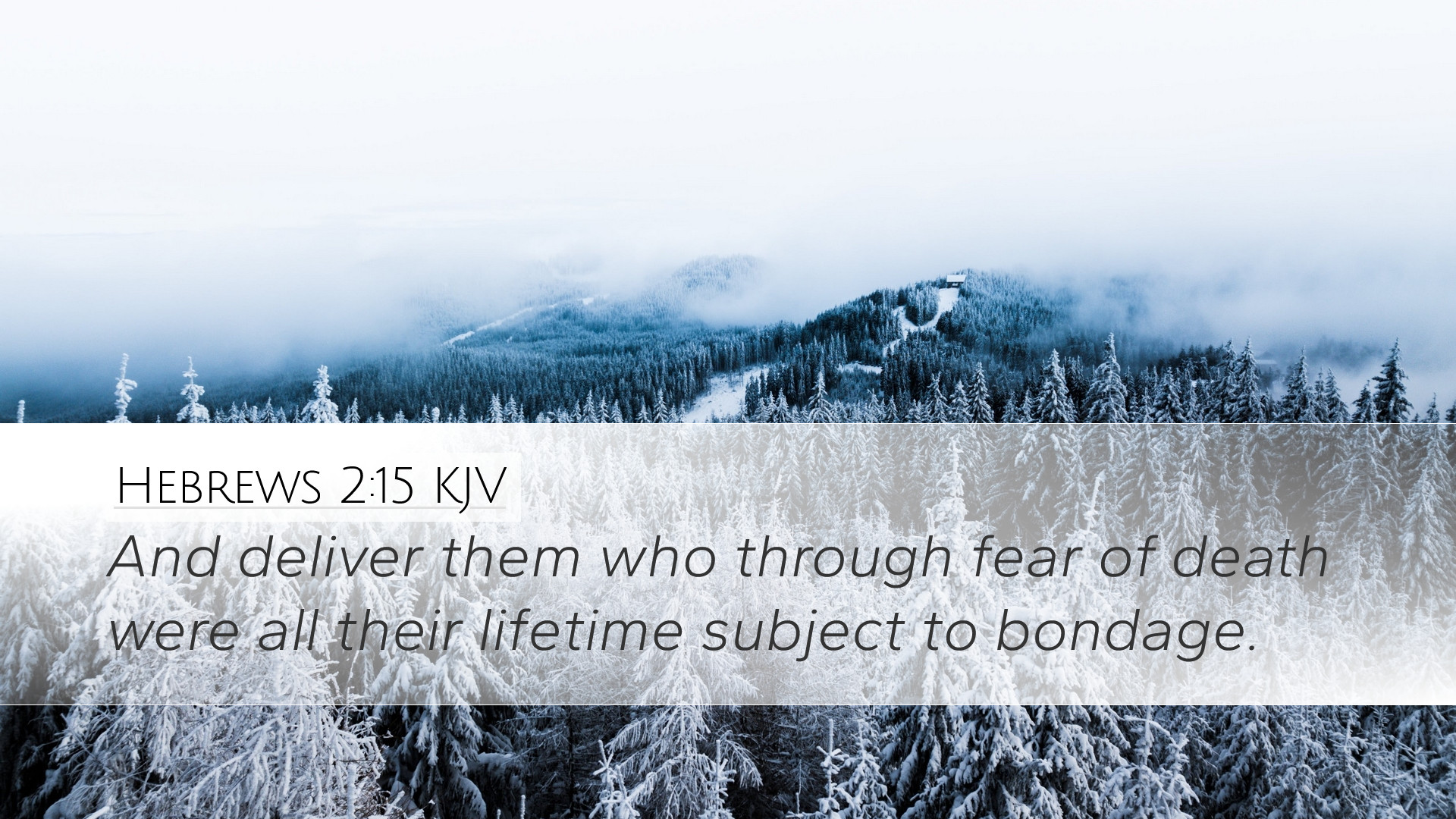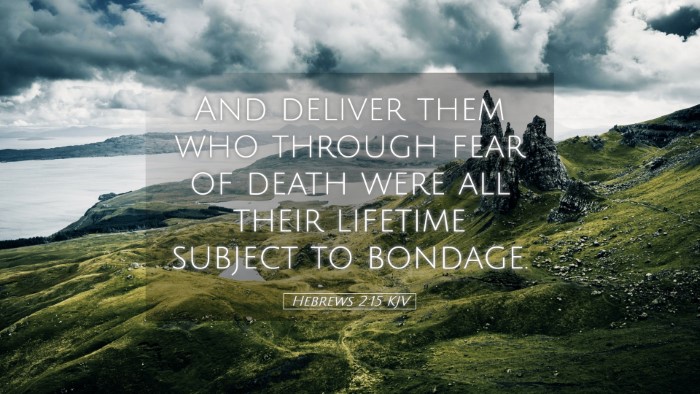Old Testament
Genesis Exodus Leviticus Numbers Deuteronomy Joshua Judges Ruth 1 Samuel 2 Samuel 1 Kings 2 Kings 1 Chronicles 2 Chronicles Ezra Nehemiah Esther Job Psalms Proverbs Ecclesiastes Song of Solomon Isaiah Jeremiah Lamentations Ezekiel Daniel Hosea Joel Amos Obadiah Jonah Micah Nahum Habakkuk Zephaniah Haggai Zechariah MalachiHebrews 2:15
Hebrews 2:15 KJV
And deliver them who through fear of death were all their lifetime subject to bondage.
Hebrews 2:15 Bible Commentary
Commentary on Hebrews 2:15
Verse Reference: Hebrews 2:15 - "And deliver them who through fear of death were all their lifetime subject to bondage."
Introduction
This verse is pivotal in understanding the implications of the death and resurrection of Jesus Christ for humanity, particularly in relation to sin, death, and fear. It speaks to the deliverance that Christ provides to those who have lived in fear of death, which can be understood as a profound bondage affecting many aspects of life.
Theological Insights
The Fear of Death
Matthew Henry comments on the pervasive nature of the fear of death, highlighting that it affects both believers and non-believers. This fear can often lead to a life dictated by anxiety and bondage, wherein individuals feel incapable of living fully due to the looming inevitability of death. Notably, this fear is a result of sin, which brought death into the world.
Christ’s Mission of Deliverance
Albert Barnes emphasizes that Christ’s purpose was to liberate humanity from the constraints imposed by sin and death. By entering into death and rising again, Jesus provided not just a path to eternal life but also a means to overcome the fear of death. This release from the fear of death is a significant aspect of Christian salvation, enabling believers to live in the freedom of Christ's victory.
Bondage and Freedom
Adam Clarke elaborates on the concept of bondage mentioned in this verse. The "bondage" refers not only to the fear surrounding death but also to the larger context of sin that grips human hearts. Clarke insists that the Gospel message is inherently one of freedom; it assures believers that they do not need to be enslaved by fear when they are assured of their salvation through faith in Jesus Christ.
Spiritual Implications
Understanding Death as a Christian
In light of this verse, Christians are called to view death through a completely different lens. Unlike those outside the faith, who may view death as the ultimate end, believers understand death as a transition to eternal life. Henry argues that this understanding alleviates fear and allows believers to live boldly.
Living Without Fear
Living without the bondage of fear leads to a fuller and more fruitful life. Barnes points out that when one embraces Christ’s promise of resurrection, it fundamentally alters their approach to life and relationships. The fear of death often inhibits true living, but the assurance of eternal life liberates individuals to serve God wholeheartedly.
The Role of the Holy Spirit
Clarke posits that the Holy Spirit plays a crucial role in empowering believers to overcome fear. Through the Spirit, Christians are equipped to face life's challenges with courage and assurance. The Spirit comforts believers by reminding them of the truth found in Scripture, including the victory that Christ has won over death.
Practical Applications
- Pastoral Care: Pastors can utilize the insights from this verse while providing support to those grieving or facing terminal illnesses. Reminding congregants of Christ's victory can bring comfort and hope.
- Preaching on Freedom: Sermons can be crafted around the themes of freedom from fear and the bondage of sin. Emphasizing the resurrection can motivate believers to embrace their faith with courage.
- Counseling the Afraid: Counselors can draw upon this verse to help individuals understand their fears in light of the Gospel, guiding them towards peace that transcends worldly anxiety.
Conclusion
Hebrews 2:15 succinctly encapsulates a core tenet of the Christian faith: that through Christ's death and resurrection, believers are liberated from the fear of death, which is a significant aspect of their salvation. By meditating on this truth, both individually and communally, believers are equipped to live not only in faith but also in freedom, fully assured of their eternal destiny.


